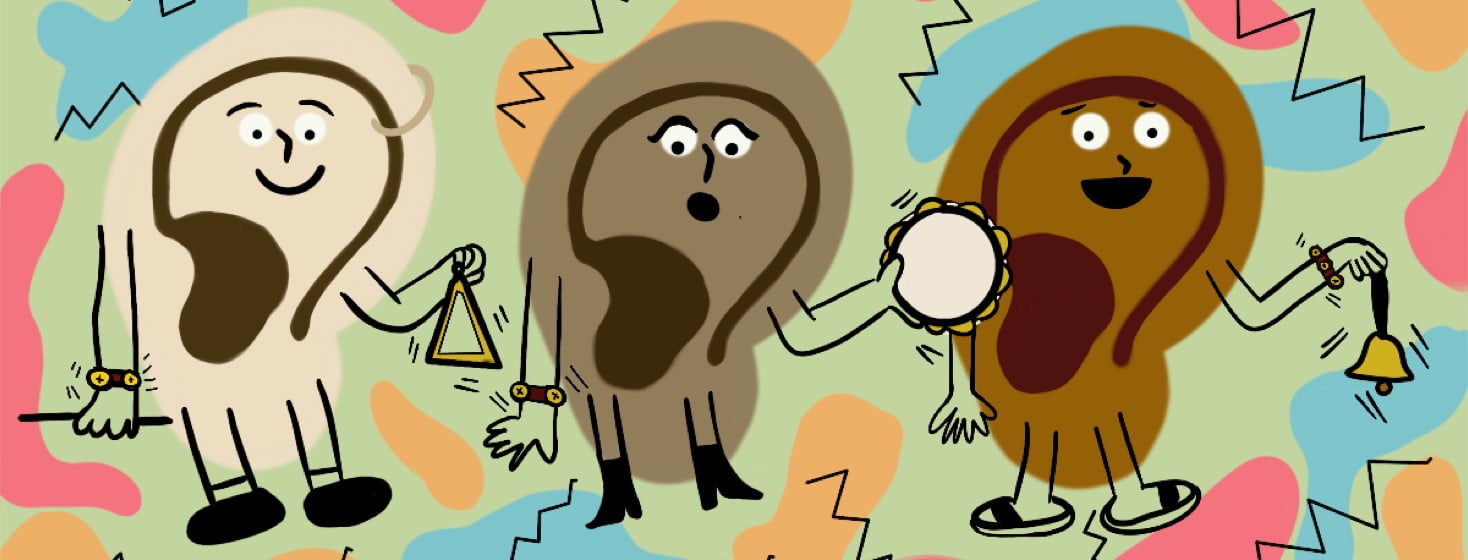Lupus and Tinnitus
Reviewed by: HU Medical Review Board | Last reviewed: March 2021 | Last updated: April 2024
Tinnitus occurs when ear damage causes someone to hear sounds that are not really there. Tinnitus can sound like:
- Ringing
- Hissing
- Rushing
- Clicking
- Humming
Lupus and tinnitus
While there are over a dozen studies on lupus and hearing loss, we know less about lupus and tinnitus. What we do know is that people who have hearing loss with lupus sometimes also have tinnitus.1,2
Lupus can damage the tissue of the inner ears, which causes tinnitus. Other symptoms of inner ear damage you may have include:1,3
- Hearing loss
- Dizziness
- Vertigo
- Aural fullness (the feeling that you get before your ears “pop” in an airplane)
Tinnitus can be bothersome
Tinnitus does not bother everybody who has it, but it deeply bothers some people. A 2017 study found that about 1 in 4 adults with tinnitus had anxiety. The same number was depressed. Among those without tinnitus, 1 in 10 had anxiety, and 1 in 10 were depressed. Anxious and depressed people with tinnitus were more likely to describe it as a “big” or “very big” problem. Tinnitus also makes it more likely that a person will consider self-harm.4,5
Tinnitus causes
One cause of tinnitus in people with lupus is autoimmune inner ear disease (AIED). In AIED, the body’s immune system attacks the inner ear. This results in damage that can cause tinnitus. While it is possible to have AIED on its own, 15 to 30 percent of those with AIED have other autoimmune disorders. These other disorders include:6,7
- Lupus
- Sjögren’s syndrome
- Cogan’s syndrome
- Rheumatoid arthritis
- Psoriasis
Sudden hearing loss and tinnitus may be the result of inflamed blood vessels (vasculitis). Vasculitis reduces blood flow, in this case to the inner ears. It can be caused by antiphospholipid syndrome. In antiphospholipid syndrome, the immune system attacks fats called phospholipids that help the blood to clot. Some people with lupus and hearing loss may have antiphospholipid syndrome.1,8,9
Tinnitus treatments
If you have tinnitus, it is likely you also have hearing loss. Your doctor or a specialist (audiologist) should test your hearing.1
Many treatments that are used for SNHL in people with lupus are also used for tinnitus. These include:1,10-12
- Corticosteroids. These can reduce vasculitis and keep the immune system from attacking the inner ears.
- Immunosuppressants and monoclonal antibodies. These drugs can also keep the immune system in check.
- Plasma transfer (plasmapheresis). This process removes the antibodies that attack phospholipids from the blood.
- Hearing aids and cochlear implants. These devices can help someone hear over the background noise of tinnitus.
Some people have also found acupuncture, which is not used for hearing loss, helpful.13
Mental health effects
Unfortunately, tinnitus is not just a physical disease. It can also be a mental health concern for those who find it distressing. Cognitive behavioral therapy can help people emotionally cope with tinnitus.4,14
Finally, antidepressants can help people living with tinnitus feel less depressed and anxious. A doctor will need to go over your symptoms carefully to find the right antidepressant. Some can make tinnitus sounds louder or more noticeable. Others can worsen other lupus symptoms like dry eye and mouth, fatigue, and light sensitivity.15-17
If you are experiencing lupus and tinnitus, talk to your doctor about what treatment may be right for you.
